【NEWSLETTER Vol.2】DIGITAL & INNOVATION PROMOTION PROJECT
Vol. 2, Published in June 2024

4th Joint Coordination Committee Meeting
Contents
- Held 3rd & 4th Joint Coordination Committee meetings
- MoH’s Health Facility Licensing Platform went live in April
- Promoted awareness-raising activities on PoC for Digitalization of Administrative Services & PPI
- Conducted Pre-incubation program in secondary cities
- Completed 1st batch of Executive Leadership Development Program
- Column 2: Daily Activities in secondary city hubs
HELD 3RD & 4TH JOINT COORDINATION COMMITTEE MEETINGS: DISCUSSED AND AGREED ON THE ACTIVITY PLAN AND STRUCTURE FOR THE LATTER PHASE OF THE PROJECT
On January 19, 2024, the 3rd Joint Coordination Committee meeting (JCC) was held at the Four Points by Sheraton Kigali. A total of 18 project stakeholders attended from Japan and Rwanda, and reported on the progress on each output of the project.
On March 1, intensive discussions for the second half of the project were held in Kigali, and on the following May 9, the 4th JCC meeting was held in the conference room of the Digital Transformation Center. The 12 project members reviewed the first two years of the project, then discussed and agreed on the future direction and structure of the project.
In the latter phase of the project, the team will work more cohesively to realize each outcome and maximize their impact.

Intensive Discussion

Group photo after Intensive Discussion
MOH'S HEALTH FACILITY LICENSING PLATFORM WENT LIVE IN APRIL
As the 1st Proof of Concept (PoC: to test the feasibility of a new service) for the digitalization of administrative services, the development of the Ministry of Health's (MoH) Health Facility Licensing Platform has been completed and launched on April 15, 2024 (https://licensing.moh.gov.rw/).
This PoC aimed to verify the feasibility of digitalizing administrative services utilizing local startups under the Public Procurement for Innovation (PPI) initiative described below, and this time succeeded in digitalizing 13 public services managed by the MoH and making them usable in actual operations. This is expected to significantly reduce the effort and time required to issue and manage licenses for health facilities. In fact, dozens of license applications have already been confirmed since the service was launched, and it has also been highly praised by senior officials of the MoH.
In the 2nd PoC (Ministry of Education (MINEDUC): development of the Students and Staff E-portfolio Management System) and the 3rd PoC (Ministry of Agriculture and Animal Resources (MINAGRI): *the scope is under discussion), we aim for more efficient and effective implementation, leveraging the knowledge and experience gained through the 1st PoC.
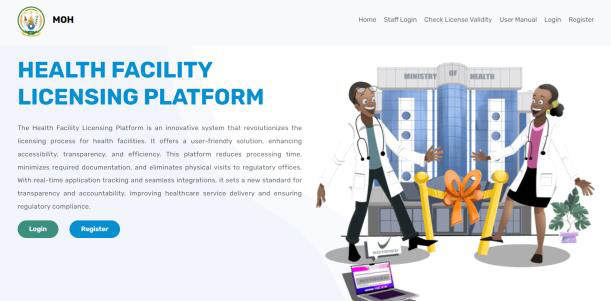
Health Facility Licensing Platform website
PROMOTED AWARENESS-RAISING ACTIVITIES ON POC FOR DIGITALIZATION OF ADMINISTRATIVE SERVICES & PPI
On January 12, 2024, we signed a contract with an local advertising agency and started disseminating the project outcomes and raising awareness of PoC and PPI. To broaden awareness of the importance of them, we are actively engaged in PR activities through such as X (Twitter) and YouTube podcasts.
The podcast, which was distributed on May 5, 2024, features an interview with Mr. Yves Iradukunda, the Permanent Secretary at the Ministry of ICT Innovation (MINICT). In the interview, he explained that 24.9% of the country's GDP (604 billion Rwandan francs in FY 2018-2019) comes from public procurement in Rwanda, and emphasized the importance of PPI as a measure to create a virtuous cycle that promotes the growth of domestic startups and ultimately the economic development throughout the country by creating an environment that provides opportunities for them to participate in public procurement, while speaking in detail about the project activities and future prospects ( https://youtu.be/-R8tQqW6NGM?si=iLE4cFZ47Be1HxuU *audio: English).
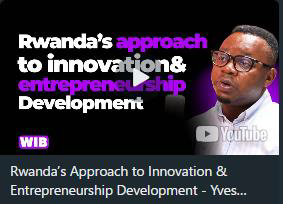
Podcasts on YouTube
CONDUCTED PRE-INCUBATION PROGRAM IN SECONDARY CITIES: A TOTAL OF 14 MVPS WERE BORN
From mid-December 2023 to mid-February 2024, a pre-incubation program was conducted in two secondary cities: Musanze and Huye. Through the program, a total of 34 teams were trained and 14 Minimum Viable Products (MVP: a product with the minimum necessary functionality) were supported for development. Young entrepreneurs who participated in the program commented that they gained not only knowledge about entrepreneurship and MVP development, but also confidence in their ability to run their own businesses (https://x.com/innovate_rwanda/status/1790380224082792745 *audio: Kinyarwanda; subtitles: English).
In the second half of the project, we will focus on establishing operational models tailored to the characteristics of each region and community so that each hub will be able to operate independently and sustainably.
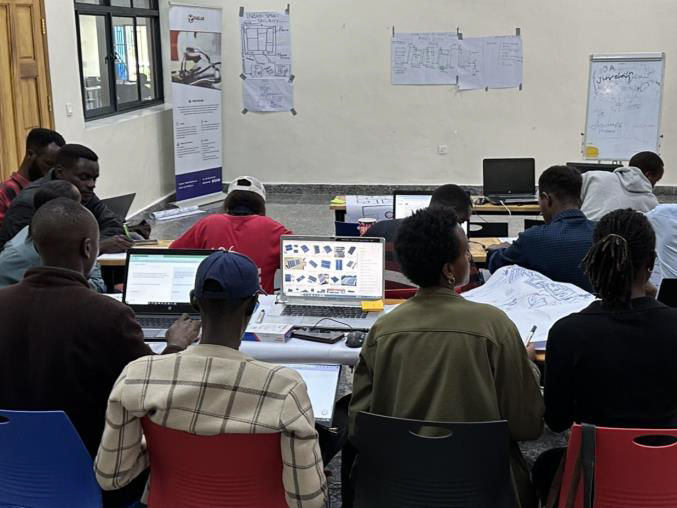
Pre-incubation program in Musanze
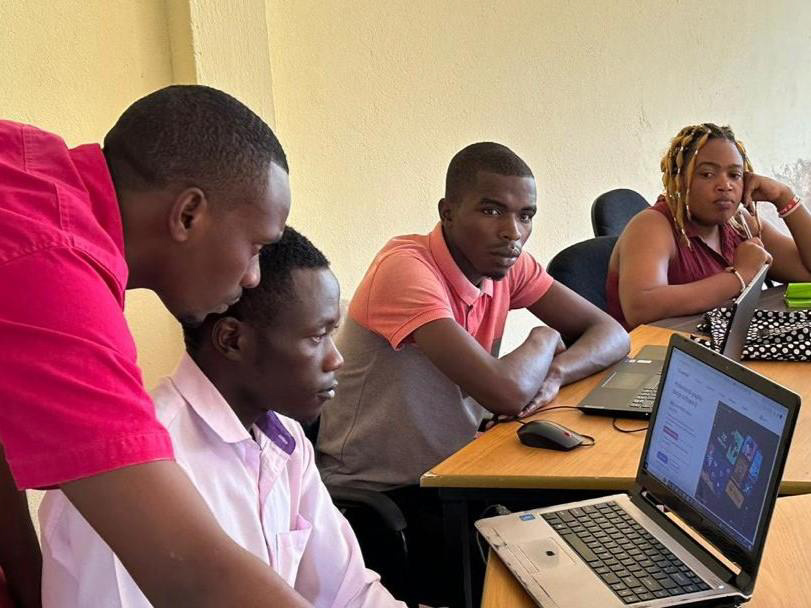
Pre-incubation program in Huye
COMPLETED 1ST BATCH OF EXECUTIVE LEADERSHIP DEVELOPMENT PROGRAM
From January 12 to February 6, 2024, the 1st batch of the Executive Leadership Development Program was held for 70 ICT and digital officials from various ministries and affiliated agencies of the Government of Rwanda. The trainees were divided into two groups of 35 people each and attended group training sessions once a week, four sessions in total, at a training venue in Kigali. During the rest of the period in the curriculum, the trainees were asked to put into practice in their workplace what they had learned in the training sessions. The training participants provided highly motivated comments, such as, "What I learned in this training will be useful in carrying out my daily work, and I would like to continue putting it into practice in the future", and "I learned basic leadership skills this time, but I would also like to improve my negotiation and public speaking skills".
After the training, we conducted an evaluation with the counterpart, the Rwanda Information Society Authority (RISA), and compiled feedback for the Skills Development Strategy for orchestrating ICT related initiatives (a.k.a. Digital Skills Development Strategy). Based on the feedback, we are currently preparing for the next program.

Group Training
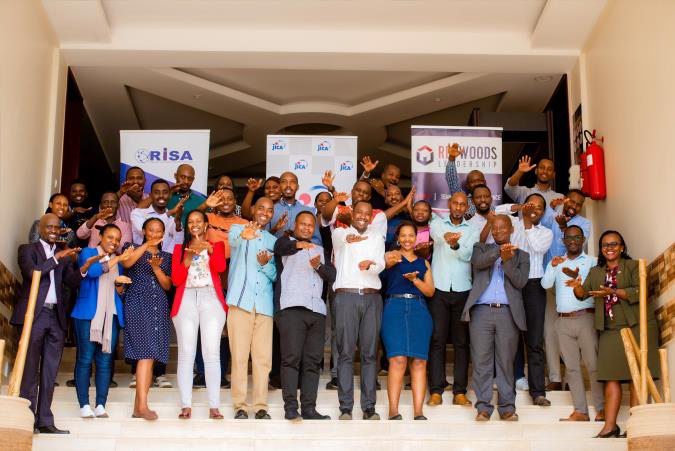
Photo Session after training
COLUMN 2: DAILY ACTIVITIES IN SECONDARY CITY HUBS
At the innovation hubs (a.k.a. Hanga Hub) in the secondary cities: Musanze and Huye, hub experts Nsoro and Chris are working on various activities to improve the environment to support entrepreneurs and strengthen the mechanisms to produce entrepreneurs. They have been invaluable to the project and are now becoming indispensable to the operation of secondary city hubs. We have conducted a question-and-answer interview with them about their daily activities and future prospects, which we would like to introduce in this column.
(Q1) Please tell us about your daily activities.
(Nsoro) I mainly inspect the hub's facilities and equipment, and provide training on how to use them to the students from Integrated Polytechnic Regional College Musanze (IPRC Musanze) and Institut d'Enseignement Supérieur de Ruhengeri (INES-Ruhengeri). At other times, I also carry out various awareness-raising activities with the help of young volunteers, and awareness of the hub is gradually increasing. Since most of the entrepreneurs are students, they usually come to the hub after classes on weekdays, and more than 20 entrepreneurs come and work here on school holidays.
(Chris) Like Nsolo, I mainly teach students from IPRC Huye how to use the hub's facilities and equipment and facilitate training sessions. I also visit surrounding schools to raise awareness of the hub.
(Q2) Which product/service did you feel had the most potential to grow as a business among the entrepreneurship support programs implemented in the last fiscal year?
(Nsoro) One is a briquette machine that uses wood waste from the hub and surrounding communities. The entrepreneurs who developped the machine are currently conducting research into the production of briquettes made from biomass (bio-briquettes), which is expected to make a significant contribution to the realization of a sustainable society in Rwanda in the future.
(Chris) Indoor smart gardens is one of the most potential solution. This utilizes IoT sensors to monitor soil humidity, temperature, etc., and automatically waters plants as needed, helping them grow in good health.

Nsoro, expert of Musanze Hanga Hub

Briquette machine developed by pre-incubation program
(Question 3) What kind of support and environment do you think will needed in the future to create innovation not only in Musanze and Huye, but also in other regional cities?
(Nsolo) It is important to raise further awareness of the hubs and support entrepreneurs in various sectors. Specifically, exchanges and visits among hubs, expanding the services offered by hubs, and issuing training certificates to trainees would be effective.
(Chris) In particular, Rwanda's agriculture and livestock industry faces many challenges, and I believe they need innovation and support. For example, there are many ideas being proposed, such as installing IoT-based scarecrows in rice fields and farms to prevent damage by birds and animals, and playing music to livestock such as cows and pigs in barns to reduce their stress and improve the efficiency of guiding work, so it would be good if any system could be put in place to support these ideas.
(Question 4) Please tell us about your future activity plans and prospects of the project.
(Nsoro) It is essential to establish a sustainable business model for the hub. Specifically, we are looking to generate revenue through such as issuing training certificates and rental office service in the hub.
(Chris) Like Nsoro, we need to consider how to ensure that local entrepreneurs and the hub remain viable after this project ends. For example, one possible way is to collect a usage fee from those who attended training on how to use the hub's facilities and equipment for their subsequent use.
(Question 5) Lastly, would you like to say anything to the project stakeholders in Japan?
(Nsoro) Not only this project, JICA's support has had a great impact on our local communities in Rwanda. If possible, I would like to visit Japan and observe Japanese innovation hubs to learn about its operational know-how. We are also considering various measures and events to further raise awareness of the hub, so I would like you to come and visit our hub someday.
(Chris) Firstly, I would like to thank JICA for its support in establishing innovation hubs in the secondary cities. I have witnessed a wonderful transformation in young people who used to spend their time in the city, coming to the hub to get trained, writing their own code, and then taking what they’ve learned at the hub back to their own schools and communities to teach. And I am proud to be here to teach them and watch them grow.

Chris, expert of Huye Hanga Hub

Discussion on business model of Huye Hanga Hub
Project Information
JICA Project Page
https://www.jica.go.jp/oda/project/202005081/index.html
JICA Rwanda Office X(Twitter) account
@JicainRwanda
Contact Us
E-mail: sshonai.jica@gmail.com
Digital & Innovation Promotion Project Public Relations (Attn: Shonai)
